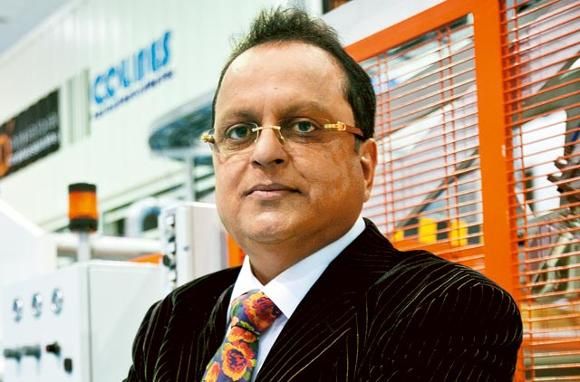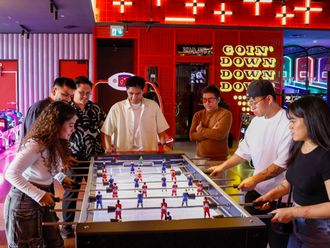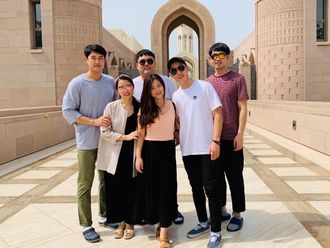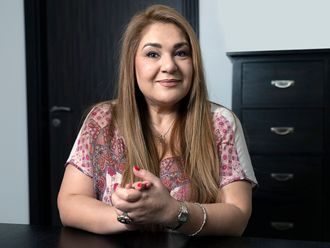
Anupam Lunavat, the founder of a Dh400 million packaging business, has always refused to be boxed in. Even as a student while his friends went to high-profile American and British universities to study business, he decided to study science at Amravati, Maharashtra, India. And he insists that’s what helped him become the success he is today.
Anupam, the third generation of a successful Indian business family, says, “I got to learn science in college, which is useful when it comes to researching products, but because I lived at home, I picked up the best lessons about business from people who have decades of experience in trading – my father, uncles and later my father-in-law – all businessmen.’’
He must have been a good student, because 54-year-old Anupam is now managing director of JRD International, which has an annual turnover of Dh200 million.
From an early age it was obvious that Anupam had a head for business. He used his pocket money to trade in shares and built a good investment portfolio before setting up his first business after graduating – selling educational films in Mumbai.
It was an instant success, and five years later, eager to diversify, he saw the huge potential in real estate and construction. So he set up a firm in Mumbai developing plots of land.
About a decade later he spotted the property boom happening in the cosmopolitan city of Bangalore in southern India, so at 36 he decided to set up base there developing plots and building high-rises.
After striking it rich in Bangalore, he moved to Dubai in 1999 and bought a failing packaging company, which he turned around.
Then last year he completed a project he had worked on for more than five years – manufacturing RMD boards, a fire-retardant, eco-friendly product that can be used as cladding for buildings, scaffolding and for interior panelling among other things.
Anupam now has a sprawling 400,000-square-metre factory with a staff of 800 in Dubai’s Jebel Ali Free Zone.
His company is poised to expand by investing Dh1.5 billion in manufacturing plants in seven countries over the next four years.
“I’ve always believed in venturing into new fields, checking out new markets, learning new things and pushing the boundaries of what can be achieved,’’ he says. “My family always believed in leading a simple life and having a big business vision. People ask me how with a background in science I have managed to dabble in so many different fields. I’ve always taken on new challenges, because if you are willing to work hard and listen to experts in the field, you can achieve success in anything you venture into.’’
Keen to diversify into the healthcare industry, Anupam shares his work ethics and dreams with Friday...
Work
There’s no magic formula for success, but hard work is an important element. That plus the patience and conviction to wait for things to work out. If you are convinced about your product or service and do your best to sell it, your business will be a success. That has been my experience.
It was my father, Premchand Lunavat, who instilled the importance of saving for a rainy day in me. He would often tell my brother, Pramod, and I to keep aside a portion of the pocket money he gave us and invest it in stocks. “They’ll pay you rich dividends when you need it,” he’d say.
I dabbled in stocks and shares in college.
I would keep a close eye on the share market, discuss it with my family, who invested in stocks, and read up about company news. After analysing the information, I’d invest using part of my pocket money. Over time I accumulated a varied and enviable portfolio.
I have a simple rule when it comes to investing in shares: If there’s a company I am convinced is a good one but whose shares are not doing well for some reason, I refuse to junk them. It could be that the company is going through a lean patch, so I wait and watch and don’t make any hasty decisions. I trust my instincts before buying or selling shares.
All this worked in my favour, because the dividends from my share portfolio helped me set up a company selling educational films when I graduated in 1981.
That first business venture was a great learning ground. I learnt a lot by trial and error – about procedural functions, administration, sales and marketing – in the four years I operated the business.
When more companies entered the educational film market, I decided to diversify and checked out the thriving real estate scene.
Diversification is another important element to success – you have to constantly keep thinking of new avenues, new challenges and push yourself to take calculated risks.
After studying the market for about a year, I entered the construction scene in Mumbai. About ten years later I found that Bangalore in southern India was booming as a technology hub. So I moved there in 1995 and invested in a real estate business. I bought properties, developed them providing basic amenities and sold them.
Keen to expand my business and looking for new challenges, in 1999 I moved to Dubai, a place I had been visiting since the late Eighties.
I came across a defunct packaging company in Jebel Ali and decided to acquire it. I had done a bit of research and found that there was a gap in the market for a diary product packaging business. I had a gut instinct it would do well.
So I bought modern packaging machines at an auction, rented a 5,000-square-foot shed in Jebel Ali and set up shop. I didn’t have much knowledge of packaging and plastics, but my father-in-law, Rasiklal Manikchand Dhariwal, a self-made man, told me, “If you are willing to work hard and have the humility to listen to experts you hire, you can achieve anything”.
As with all my projects, I put 100 per cent into this, often working 18 hours a day. I read all I could on the packaging business, spoke to people in the know and began scouting for talent here and in India to come on board.
I got a core team of managers to identify the areas in the market. Because we were pretty much the only company of its kind in the business, we didn’t have to face too many hurdles. I also hired a childhood friend of mine, Sagar Verma, who is a talented
plastics engineer and was working with Reliance – a multi-million-dollar company – in India, and he helped modernise our packaging division.
My wife, Kalpana, helped me a great deal. She handles the HR division of the company and goes to great lengths to see that the staff are motivated and well looked after.
By 2000 our packaging plant was functional and by 2003 we had a huge section of the market covered.
But not wanting to rest on my success, I decided to diversify yet again. My dream was to create a unique eco-friendly product that could be used as cladding for buildings.
Again, I did a lot of research, travelling to Italy and other countries to learn about cladding products. It took us five years to understand and acquire the technology and patent it to create a product to address all issues of the construction industry without really damaging the environment.
I named it RMD board as a tribute to my mentor, my father-in-law Rasiklal Manikchand Dhariwal, who I still look to for advice.
I operate an open-door policy in my company. Workers can come in at any time
and discuss their problems. If they are contributing to our progress then I believe
their issues deserve a just hearing.
I greatly value the staff’s role in the success of our company and never lose an opportunity to praise them and motivate them to do better. I firmly believe in providing a supportive and stimulating environment for staff to innovate.
Play
I learnt the basics of business as a child, picking cotton with farmhands in the sprawling 12,000 acres of cotton fields that belonged to my family in Maharashtra. I recall gazing at the vast fields, admiring the woolly white cotton bulbs and watching the farmhands pick cotton as they sang songs. I learnt a lot during those years – of the importance of interacting closely with workers to know their problems; starting out from the lowest rung in the business so I know the process well.
My father and mother Devbala were agriculturists who managed the cotton farms. My father taught Pramod, my elder sister Pratibha and I the intricacies of the cotton business. He taught us how to monitor the market, the prices, the weather and keep in mind the well-being of the farmhands.
He also taught us the importance of taking calculated risks – farming is dependant on so many variables. I learnt very early in life that it was important to be a tad adventurous and ready to take a gamble in business if you believed it could work.
Many of my uncles were industrialists and our family owned around 80 villages in Amravati. We lived in a close-knit community and my father believed in the welfare of the community. He would always put the interests of the community on his list of priorities. He taught me how to nurture relationships, which has helped me in my personal and business life. Once a client approaches us, he is loyal to us.
I value transparent and sincere relationships.
I moved to Mumbai from Amravati in 1981 to train in the family business run by some of my uncles there. I also set up my film business at this time and in 1982, at the age of 23, got married to Kalpana.
It was an arranged marriage. I had the unique opportunity to be mentored and groomed by my father-in-law. He has been the most important influence on my life.
My wife Kalpana has been my closest confidante. We have three daughters; Nikita, 28, Rashi, 24, and Sanyukta, 17. Kalpana and I spend our free time together, even travelling together for business. We begin most days with an early morning walk, after which she accompanies me to work. She is a wonderful mother, wife, colleague and companion.
Dream
I live and dream business, which has really shaped me as a person, and I have plans of expansion and diversification. I have great dreams for my family and look at training
my daughters in business and handling various aspects and divisions.
I plan to diversify into health and environment, as these areas are close to our hearts. My daughters and my wife are very health-conscious and I think this is a good
area for building future businesses.
I am already in the process of finalising a health clinic for cryogenic technology towards initiating anti-aging procedures and also plan to expand into other biotechnology products.
I have a project on hydroponics, which essentially means growing plants without soil with nutrients dissolved in the water supply.
I also dream of doing a lot more for charity in India as well as the UAE.
I know in a few years I will be ready to take off on another flight of fancy and venture into yet another unknown field because that is my temperament.
My success with JRD packaging and RMD boards only spurs me on to reach greater heights. Only time will tell what those will be!












